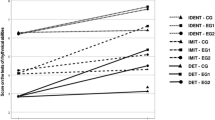Abstract
Computer technology assistance is an important branch of CAD, which plays an irreplaceable role in the fields of machinery, electronics, education and architecture. In order to study the effect of computer technology on music therapy for special children, the computer layout is designed on the basis of computer technology assistance. The author studied the effect of music therapy for special children in computer aided team, analyzed the therapeutic effect of music therapy on special children, and expounded the feasibility of music therapy. The results show that music therapy can improve language communication and emotional stability of special children, so as to ensure normal communication with people, improve emotional barriers of special children, and improve interpersonal skills. The effect of music therapy on emotional reaction and communication ability is more obvious, but the effect on movement coordination is not significant. Therefore, this article can play a guiding role in the music treatment of special children.





Similar content being viewed by others
Change history
06 December 2022
This article has been retracted. Please see the Retraction Notice for more detail: https://doi.org/10.1007/s10586-022-03872-0
References
Bird, L.M., Tan, W.H., Wolf, L.: The role of computer-aider facial recognition technology in accelerating the identification of angeiman syndrome. American J. Med. Genet. Part A. 167(8), 1720–1725 (2015)
Bolshakov, A., Gracheva, M., Rozhkova, G.: The benefits of applying modern 3D technologies in computer-aided diagnostics and functional treatment of amblyopia and binocular disorders. Perception 43(1), 165–166 (2014)
Brown, W.H.: The exceptional child: inclusion in early childhood education, 4th edition. Top. Early Child. Spec. Educ. 21(4), 233–235 (2001)
Byrne, J.: Computer-aided translation technology: a practical introduction. Interpret. Transl. Train. 1(2), 324–329 (2007)
Carasco, E.: Infantile autism and music therapy[J]. Eur Psychiatry. 29(8), 667–669 (2014)
Cohen, N.S.: Music therapy handbook. J. Music Ther. 52(2), 319–321 (2015)
Gardstrom, S.C.: Music therapy research. Arts Psychother. 34(4), 362–364 (2007)
Ghribi, A., Gasmi, M., Ben Slama, A., Sghairoun, N., Hamzaoui, M.: An exceptional presacral mass in children: rectal duplication. Arch. Pediatr. 21(3), 322–324 (2014)
Guha, M.: Music therapy and addictions. Int. J. Soc. Psychiatry 58(5), 555–557 (2012)
Horowitz, S.: Music therapy with families. Nordic J. Music Ther. 26(5), 474–475 (2017)
Korczynski, A., Ludomirska, P.I.: Computer-aided didactic DISKCHEM system as an aid in teaching chemical technology. Przem. Chem. 82(8–9), 1337–1339 (2003)
Lambrecht, J.T.: Three-dimensional model technology for computer-aided surgery. Dentomaxillofacial Radiol. 26(5), 263–264 (1997)
Lee, J.H., Kim, H.G.: Fabricating a ceramic-pressed-to-metal restoration with computer-aided design, computer-aided manufacturing and selective laser sintering: a case report. J. Korean Dent. Sci. 8(1), 41–47 (2015)
Miller, E.: Bio-guided music therapy. Appl. Psychophysiol. Biofeedback 37(4), 309–310 (2012)
Raglio, A.: When music becomes music therapy. Psychiatry Clin. Neurosci. 65(7), 682–683 (2011)
Ruth, B.: Music therapy: death and grief. Nordic J. Music Ther. 16(2), 179–180 (2007)
Diaz, L.A., Hengsbach, S., Bade, K.: Lotus-on-chip: computer-aided design and 3D direct laser writing of bioinspired surfaces for controlling the wettability of materials and devices. Bioinspiration Biomim. 12(6), 066004 (2017)
Shanmugam, G., Jeon, J.: Computer-aided drug discovery in plant pathology. Plant Pathol. J. 33(6), 529–542 (2017)
Simandl, V., Vanicek, J.: Influences on ICT teachers knowledge and routines in a technical e-safety context. Telemat. Inform. 34(8), 1488–1502 (2017)
Valentine, M., Bihm, D.C., Wolf, L., et al.: Computer-aided recognition of facial attributes for fetal alcohol spectrum disorders. Pediatrics 140(6), 148–153 (2017)
Ludwig, S.A., Kong, J.: Investigation of different classifiers and channel configurations of a mobile P300-based brain-computer interface. Med. Biol. Eng. Comput. 55(12), 2143–2154 (2017)
Wei, M., Chen, J., Guo, Y., Sun, H.: The computer-aided parallel external fixator for complex lower limb deformity correction. Int. J. Comput. Assist. Radiol. Surg. 12(12), 2107–2117 (2017)
Acknowledgements
Hunan Province philosophy and social science fund project, Project No. 16YBA105, Title: “study of music and therapy strategies in college students’ mental health education”.
Author information
Authors and Affiliations
Corresponding author
Additional information
This article has been retracted. Please see the retraction notice for more detail: https://doi.org/10.1007/s10586-022-03872-0"
Rights and permissions
Springer Nature or its licensor (e.g. a society or other partner) holds exclusive rights to this article under a publishing agreement with the author(s) or other rightsholder(s); author self-archiving of the accepted manuscript version of this article is solely governed by the terms of such publishing agreement and applicable law.
About this article
Cite this article
Yin, T. RETRACTED ARTICLE: Research on computer technical assistance tools for special children for music therapy. Cluster Comput 22 (Suppl 2), 3605–3612 (2019). https://doi.org/10.1007/s10586-018-2210-3
Received:
Revised:
Accepted:
Published:
Issue Date:
DOI: https://doi.org/10.1007/s10586-018-2210-3




